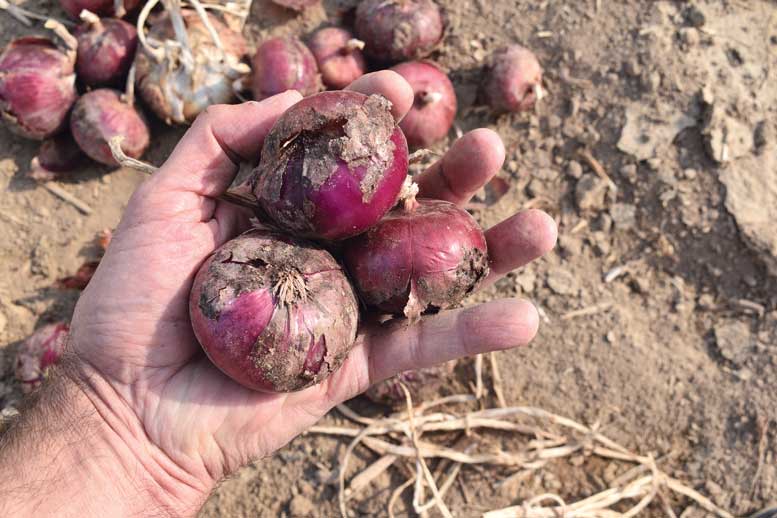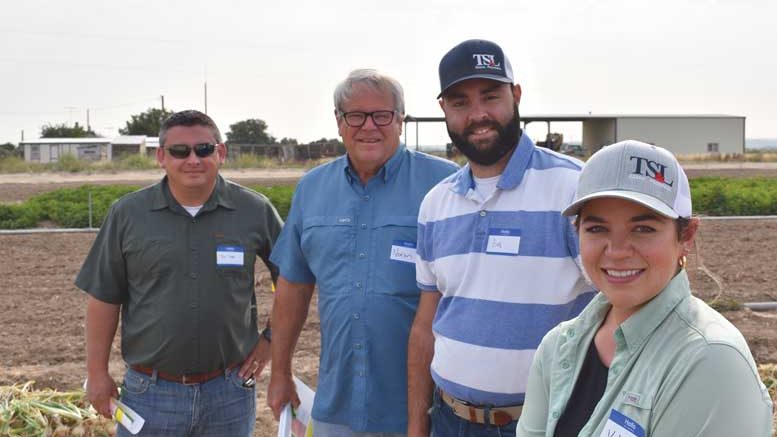|
Click to listen to this article
|
Story and photos by Dave Alexander, Publisher
Malheur Experiment Station Onion Variety Day
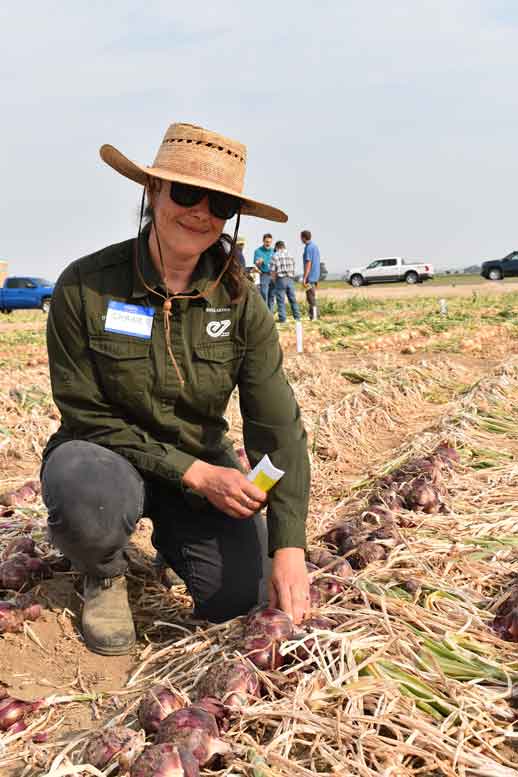
Nearly everyone has seen the “shell game,” whether in person or portrayed on film. Typically run by grifters and swindlers, the game uses three cups with a walnut shell under one of the cups. The operator then shuffles the cups around, and the player has to guess which cup has the shell. Guess the right cup and the player wins.
At any given onion field day, it can be difficult to distinguish one variety from another. If you took three different reds, juggled them behind your back in a modified version of the shell game, then asked anyone to name which of the three you held out in your hand, few would be able to identify the variety. Only the most discerning eye would have better than a 33 percent chance of naming the onion and winning the game.
But that similarity grew more disparate this year at the Oregon State University (OSU) variety trial. Mother Nature cranked up her blast furnace this summer to record levels. Some onions at the trial did not size up, and some commercial producers will see yields drop as much as 30 to 40 percent in the Treasure Valley.
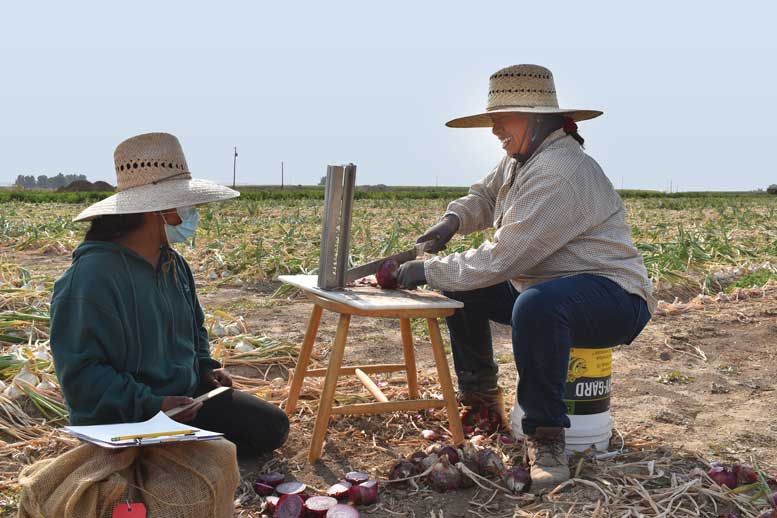
Erik Feibert, OSU senior faculty research assistant, ran this year’s onion trials at the Malheur Experiment Station in Ontario, Oregon. He said due to a combination of heat and day length, bulbing and maturation started earlier this year. Higher soil temperatures led to stressed onions, more pink root and big differences in sizes of the tested varieties.
Record average high temperatures pounded the area this summer. The average low temperatures were also higher than normal, meaning it did not cool down as much at night. Temperatures in June were the highest since 1961. For the month of July, you have to go all the way back to 1943 to find a summer as miserable as the one the Treasure Valley had this year.
In a trial, all varieties receive the same water and inputs, but in a commercial field, adjustments are made based on what the crop needs. Just because a variety didn’t size up in the trial doesn’t necessarily mean it didn’t perform on the farm.
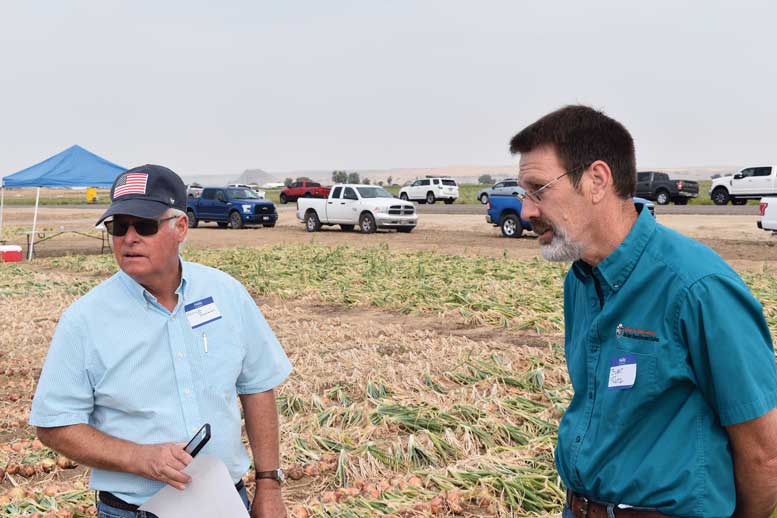
Even so, Tiffany Cruickshank with Snake River Produce in Nyssa, Oregon, said they will have “lower yields across the board.” She said a windy and dry spring combined with extreme temperatures kept the tops from developing, and those smaller tops could not protect the onions from the heat.
“Tops dropped a week to two weeks ahead of a normal year, leading to some varieties in the test being undersized,” Feibert said.
Troy Seward with Golden West Produce in Parma, Idaho, was still harvesting at press time and did not know the overall impact the heat had, but he said there will be a “definite decrease in yields.” He went on to say that yield suffered in varieties that have less of a canopy and he expects that the overall Treasure Valley crop yield will be down significantly.
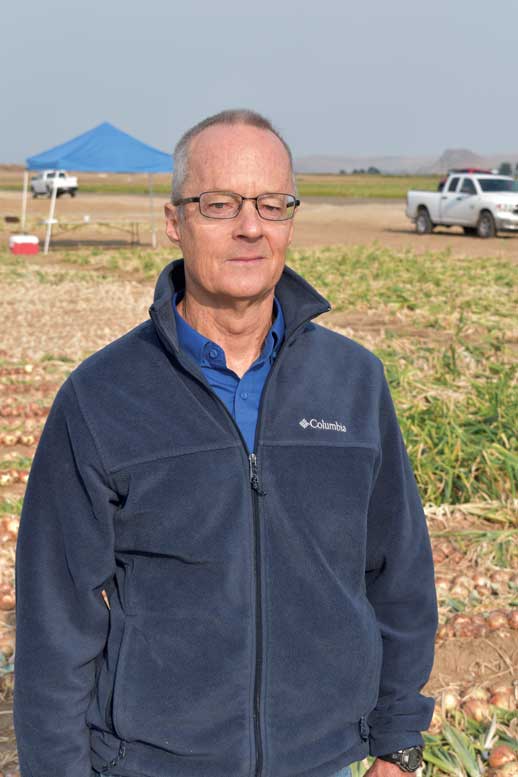
Tops were also smaller in the Columbia Basin of Washington. Kerrick Bauman with L&L Ag Production in Othello, Washington, drove six hours south to see the Malheur trial. He said the Basin also had record heat, but it did cool off at night more than the Treasure Valley.
“The onions are there, the quality’s good generally, but there’s just a smaller profile,” Bauman said.
While Feibert could not do anything about the extreme temperatures, he did make a change in the trial this year to better match what growers are doing. Growers are looking for jumbos because there is a smaller market for colossal and super colossal onions. To mirror this, Feibert increased the trial’s plant population from 120,000 to 137,000 plants per acre.
Ironically, prices are currently up on larger onions because there are so few of them due to the tough growing conditions this summer. On Sept. 22, 50-pound sacks of yellow super colossals were selling between $18 and $20, double what they were in 2020.
Given the historic heat in 2021, hopefully next year won’t be as sweltering or daunting for growers in western Idaho and eastern Oregon. Unless there is another blast furnace of a summer, onions will look more similar at trials, and the modified shell game will be harder to win.
